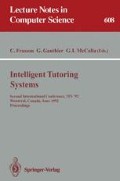Abstract
This paper describes an approach to the design of online help for programming tasks and modelling tasks, based on a theoretical framework of problem solving and learning. The framework leads to several design principles which are important to the problem of when and how to supply help information to a learner who is constructing a solution to a given problem. We will describe two example domains where we apply these design principles: The ABSYNT problem solving monitor supports learners with help and proposals for functional programming. The PETRI-HELP system currently under development is intended to support the learning of modelling with Petri nets.
Preview
Unable to display preview. Download preview PDF.
References
J.R. Anderson: The Architecture of Cognition. Cambridge: Harvard University Press, 1983
J.R. Anderson: Knowledge Compilation: The General Learning Mechanism. In: R.S. Michalski, J.G. Carbonell, T.M. Mitchell, Machine Learning II. Kaufman, 1986, 289–310
J.R. Anderson: Production Systems, Learning, and Tutoring, in D. Klahr, P. Langley, R. Neches (eds): Production System Models of Learning and Development. Cambridge: MIT Press, 1987, 437–458
J.R. Anderson: A Theory of the Origins of Human Knowledge, Artificial Intelligence, 1989, 40, 313–351
J.R. Anderson, F.G. Conrad, A.T. Corbett: Skill Acquisition and the LISP Tutor, Cognitive Science, 1989, 13, 467–505
F.L. Bauer, G. Goos: Informatik, 1. Teil, Berlin: Springer, 1982 (third ed.)
J.S. Brown, K. van Lehn: Repair Theory: A Generative Theory of Bugs in Procedural Skills. Cognitive Science, 1980, 4, 379–426
M.T.H. Chi, M. Bassok, M.W. Lewis, P. Reimann, R. Glaser: Self-Explanations: How Students Study and Use Examples in Learning to Solve Problems, Cognitive Science, 1989, 13, 145–182
E.M. Clarke, F.A. Emerson, A.P. Sistla: Automatic Verification of Finite-State Concurrent Systems Using Temporal Logic Specifications. ACM Transactions on Programming Languages and Systems, 1986, Vol. 8, No. 2, 244–263
G.W. Ernst, A. Newell: GPS: A Case Study in Generality and Problem Solving, New York: Academic Press, 1969
P.M. Gollwitzer: Action Phases and Mind-Sets, in: E.T. Higgins, R.M. Sorrentino (eds), Handbook of Motivation and Cognition, 1990, Vol.2, 53–92
H. Heckhausen: Motivation und Handeln, Heidelberg: Springer, 1989 (second ed.)
B. Josko: Verifying the Correctness of AADL Modules using Model Checking. In: de Bakker, de Roever, Rozenberg (eds): Proceedings REX-Workshop on Stepwise Refinement of Distributed Systems: Models, Formalisms, Correctness. Springer LNCS 430, 1990
J.E. Laird, P.S. Rosenbloom, A. Newell: Universal Subgoaling and Chunking. The Automatic Generation and Learning of Goal Hierarchies, Boston: Kluwer, 1986
J.E. Laird, P.S. Rosenbloom, A. Newell: SOAR: An Architecture for General Intelligence, Artificial Intelligence, 1987, 33, 1–64
C. Lewis: Composition of Productions, in D. Klahr, P. Langley, R. Neches (eds), Production System Models of Learning and Development. Cambridge: MET Press, 1987, 329–358
C. Möbus: The Relevance of Computational Models of Knowledge Acquisition for the Design of Helps in the Problem Solving Monitor ABSYNT, in R.Lewis, S.Otsuki (eds), Advanced Research on Computers in Education, IFIP TC3, North-Holland, 1991, 137–144
C. Möbus, K. Pitschke, O. Schröder: Ein wissensstandsbezogenes Hilfesystem für Petrinetzmodellierer, in: V. Claus, U. Lichtblau (eds): 2. Kolloquium der Arbeitsgruppe Informatiksysteme, Bericht AIS-3, Universität Oldenburg, 1991
C. Möbus, O. Schröder: Representing Semantic Knowledge with 2-dimensional Rules in the Domain of Functional Programming, in: P.Gorny, M. Tauber (eds), Visualization in Human-Computer Interaction, Springer, 1990 (LNCS 439), 47–81
C. Möbus, O. Schröder, H.-J. Thole: Runtime Modeling the Novice-Expert Shift in Programming Skills on a Rule-Schema-Case Continuum, in: J. Kay; A. Quilici (eds), Proc IJCAI Workshop W.4 Agent Modelling for Intelligent Interaction, 1991, 137–143
C. Möbus, H.-J. Thole: Interactive Support for Planning Visual Programs in the Problem Solving Monitor ABSYNT: Giving Feedback to User Hypotheses on the Basis of a Goals-Means-Relation, in: D.H. Norrie, H.-W. Six (eds), Proc. 3rd Int. Conf on Computer-Assisted Learning ICCAL 90, Heidelberg: Springer, 1990 (LNCS 438), 36–49
D.M. Neves, J.R. Anderson: Knowledge Compilation: Mechanisms for the Automatization of, Cognitive Skills, in J.R. Anderson (ed), Cognitive Skills and their Acquisition. Hillsdale, Erlbaum, 1981, 57–84
O. Schröder: A Model of the Acquisition of Rule Knowledge with Visual Helps: The Operational Knowledge for a Functional Visual Programming Language, in: D.H. Norrie, H.-W. Six (eds), ICCAL 90, Heidelberg: Springer, 1990 (LNCS 438), 142–157
J.A. Self: Bypassing the Intractable Problem of Student Modelling, in C. Frasson, G. Gauthier (eds), Intelligent Tutoring Systems, Norwood: Ablex, 1990, 107–123
D. Sleeman, J.S. Brown (eds), Intelligent Tutoring Systems, New York: Acad Press, 1982
K. van Lehn: Toward a Theory of Impasse-Driven Learning, in H. Mandl, A. Lesgold (eds), Learning Issues for Intelligent Tutoring Systems. New York: Springer, 1988, 19–41
K. van Lehn: Mind Bugs: The Origins of Procedural Misconceptions, MIT Press, 1990
K. van Lehn: Rule Acquisition Events in the Discovery of Problem-Solving Strategies, Cognitive Science, 1991, 15, 1–47
K. van Lehn:, R.M. Jones, M.T.H Chi: Modelling the Self-Explanation Effect with Cascade 3, Learning Research and Development Center, University of Pittsburgh, 1991
S.A. Vere: Relational Production Systems, Artificial Intelligence, 1977, 8, 47–68
E. Wenger: Artificial Intelligence and Tutoring Systems, Los Altos: Kaufman, 1987
R. Winkels, J. Breuker: Discourse Planning in Intelligent Help Systems, in: C. Frasson, G. Gauthier (eds), Intelligent Tutoring Systems, Norwood: Ablex, 1990, 124–139
J.G. Wolff: Cognitive Development as Optimisation, in L. Bolc (ed), Computational Models of Learning. Berlin: Springer, 1987, 161–205
Author information
Authors and Affiliations
Editor information
Rights and permissions
Copyright information
© 1992 Springer-Verlag Berlin Heidelberg
About this paper
Cite this paper
Möbus, C., Pitschke, K., Schröder, O. (1992). Towards the theory-guided design of help systems for programming and modelling tasks. In: Frasson, C., Gauthier, G., McCalla, G.I. (eds) Intelligent Tutoring Systems. ITS 1992. Lecture Notes in Computer Science, vol 608. Springer, Berlin, Heidelberg. https://doi.org/10.1007/3-540-55606-0_37
Download citation
DOI: https://doi.org/10.1007/3-540-55606-0_37
Published:
Publisher Name: Springer, Berlin, Heidelberg
Print ISBN: 978-3-540-55606-0
Online ISBN: 978-3-540-47254-4
eBook Packages: Springer Book Archive

